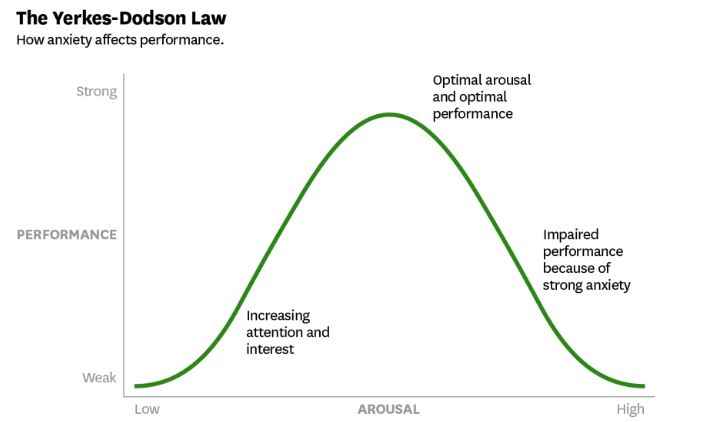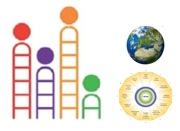
Everywhere I go in the course of my work with complex children and families, I find schools and children and families and staff under huge pressure, delivering curriculum that are becoming more and more preset.
What I hear over and over again is that the curriculum has become so super-charged that the times that used to be available in the day and week for just easing off pressure and taking a step back to explore a wider field have become more and more rare. So, what has an understanding of psychology got to tell us about this situation and about it's likely impact on child mental health and educational outcomes?
One really important well-known graph that is incredibly important in understanding child and adult mental health and wellbeing, and educational outcomes is the Yerkes-Dodson (1908) arousal performance curve. According to many studies, and this well recognised graph, human beings perform best if there is a certain amount of heightened arousal around in the context that evokes and is associated with curiosity and focus. In the face of stimuli that evoke moderate curiosity and excitement and a sense of opportunity, human beings - children and adults - pay attention and focus much better than in the face of stimuli which evoke little or any curiosity or need to pay attention. With alertness, engagement and motivation to perform, we see children and adults producing better results than when they are bored and uninterested.
However, the Yerkes Dodson graph also shows us that too MUCH arousal or anxiety leads to very significant deteriorations in performance. This is important. Both ends of this Yerkes-Dodson curve are important to making sense of what is happening in our schools.
My observation is that the relentless pressure on adults in our schools is being transferred to our children and it is complex children where the crushing or explosive impact of these pressures are observed most. Most concerning is the situation when teachers find that the complex child is a barrier to them being able to deliver the results that are being expected of them.
Unless the teacher, and usually also their head teacher, is confident and able to resist and stand up to the Ofsted-driven pressures upon them, the child and adult in the classroom are placed in an impossible pressure cooker situation. What we find too often rather than collaboration and curiosity is a battle ground between adult and child where the adults feel they must MAKE the child learn, and the child's role becomes too often one of deeply reluctant co-operation or active resistance.
Not long ago I was asked to observe a young 9 year old with diagnosed learning difficulties - probably due to foetal alcohol syndrome - the aim was to help think about his future educational options. He was in Year 5 but was managing work appropriate to a Y2 child. I observed this child working with a TA who was trying to teach him fractions, counting beads and using worksheets. The child had questions of football on his mind, and what was going to happen at playtime because a friend had been sent home. 40 mins later, the exasperated TA lamented - "his concentration is really no good today". For my part, I wondered just how many times people had tried to teach him about fractions - and how many more times they were going to continue to try to do so on his journey through our school system .
The point was, fractions were not interesting to him in that moment - certainly not in the format being presented - yet adults were feeling obliged to keep working at it, because their job was to hit targets. I wondered how many more adults would have to spend a frustrating time trying to teach him something that was not connected to what he wanted to learn.
As I heard another headteacher talking about the numbers of staff who were disengaging and excessively stressed, I also wondered about the impact on the sense of Self of both child and adult of this very unsatisfactory set up. I heard that in a matter of a few months, the child I had been observing, had gone from being a child who was desperate to please to a child who had become disengaged and cocky and 'strutting his stuff'.
Frankly though, where do you go, and how do you behave when you start to realise that what is being offered to you in school involves endless hours doing things you are heartily fed up of doing? In such a situation, thinking about football and playing up the teacher sounds quite an entertaining option, doesn't it? So, does this child with challenging behaviour have a mental health problem? I think he is on his way there.
I wonder when it will become accepted that so many top down instructions do not bring out the best in our teachers nor in our young people?
I wonder when enough teachers will have the energy at the end of the day to speak up about situations that too many know cannot be right. Is there enough space to engage curiosity and enhance motivation in your school day? How do you think these issues are related to child mental health? If you are interested in reading more about these issues, why not Click here to sign up for the I Matter Monthly Digest Newsletter
What I hear over and over again is that the curriculum has become so super-charged that the times that used to be available in the day and week for just easing off pressure and taking a step back to explore a wider field have become more and more rare. So, what has an understanding of psychology got to tell us about this situation and about it's likely impact on child mental health and educational outcomes?
One really important well-known graph that is incredibly important in understanding child and adult mental health and wellbeing, and educational outcomes is the Yerkes-Dodson (1908) arousal performance curve. According to many studies, and this well recognised graph, human beings perform best if there is a certain amount of heightened arousal around in the context that evokes and is associated with curiosity and focus. In the face of stimuli that evoke moderate curiosity and excitement and a sense of opportunity, human beings - children and adults - pay attention and focus much better than in the face of stimuli which evoke little or any curiosity or need to pay attention. With alertness, engagement and motivation to perform, we see children and adults producing better results than when they are bored and uninterested.
However, the Yerkes Dodson graph also shows us that too MUCH arousal or anxiety leads to very significant deteriorations in performance. This is important. Both ends of this Yerkes-Dodson curve are important to making sense of what is happening in our schools.
My observation is that the relentless pressure on adults in our schools is being transferred to our children and it is complex children where the crushing or explosive impact of these pressures are observed most. Most concerning is the situation when teachers find that the complex child is a barrier to them being able to deliver the results that are being expected of them.
Unless the teacher, and usually also their head teacher, is confident and able to resist and stand up to the Ofsted-driven pressures upon them, the child and adult in the classroom are placed in an impossible pressure cooker situation. What we find too often rather than collaboration and curiosity is a battle ground between adult and child where the adults feel they must MAKE the child learn, and the child's role becomes too often one of deeply reluctant co-operation or active resistance.
Not long ago I was asked to observe a young 9 year old with diagnosed learning difficulties - probably due to foetal alcohol syndrome - the aim was to help think about his future educational options. He was in Year 5 but was managing work appropriate to a Y2 child. I observed this child working with a TA who was trying to teach him fractions, counting beads and using worksheets. The child had questions of football on his mind, and what was going to happen at playtime because a friend had been sent home. 40 mins later, the exasperated TA lamented - "his concentration is really no good today". For my part, I wondered just how many times people had tried to teach him about fractions - and how many more times they were going to continue to try to do so on his journey through our school system .
The point was, fractions were not interesting to him in that moment - certainly not in the format being presented - yet adults were feeling obliged to keep working at it, because their job was to hit targets. I wondered how many more adults would have to spend a frustrating time trying to teach him something that was not connected to what he wanted to learn.
As I heard another headteacher talking about the numbers of staff who were disengaging and excessively stressed, I also wondered about the impact on the sense of Self of both child and adult of this very unsatisfactory set up. I heard that in a matter of a few months, the child I had been observing, had gone from being a child who was desperate to please to a child who had become disengaged and cocky and 'strutting his stuff'.
Frankly though, where do you go, and how do you behave when you start to realise that what is being offered to you in school involves endless hours doing things you are heartily fed up of doing? In such a situation, thinking about football and playing up the teacher sounds quite an entertaining option, doesn't it? So, does this child with challenging behaviour have a mental health problem? I think he is on his way there.
I wonder when it will become accepted that so many top down instructions do not bring out the best in our teachers nor in our young people?
I wonder when enough teachers will have the energy at the end of the day to speak up about situations that too many know cannot be right. Is there enough space to engage curiosity and enhance motivation in your school day? How do you think these issues are related to child mental health? If you are interested in reading more about these issues, why not Click here to sign up for the I Matter Monthly Digest Newsletter

Comments